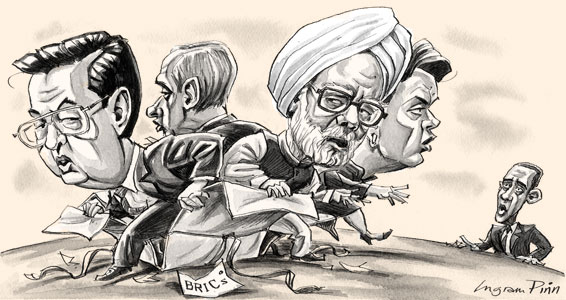
In his recent column in the Financial Times, entitled “A Story of Brics without mortar”, Philip Stephens writes that it is “time to bid farewell to the BRICS”. To support his claim, he goes through a list of arguments to point out that Brazil, Russia, India and China have simply too little in common to engage in a meaningful way. None of the arguments he makes are really new. We all know that Russia and China are authoritarian while Brazil and India are vibrant democracies. And the fact that China and India have a complicated relationship that may at some point lead to conflict is one of the key issues in today’s international debate (I have written about it last week here).
In fact, the majority of international commentators have, over the past years, argued that the BRIC club is nothing more than a fad. The fact that the BRICS’ member countries’ heads of government still decided to set up regular summits has caught many by surprise, defying common sense: Why would national leaders waste their time flying around the world to meet with other emerging powers’ leaders that had been randomly thrown together by a bored British investment banker?
While I am not trying to argue that the BRICS will ever turn into anything comparable to NATO or the EU, it is worth pointing out that the majority of analysts deriding the BRICS initiative do not live in either Brazil, Russia, India, China or South Africa; in fact, they are mostly based in Europe and the United States. Policy analysts in Brazil, India and Co. may question the utility of the alliance, but outsiders from established powers are far more pessimistic in their assessment. Indeed, in order to understand the geopolitical dynamics that shape the BRICS grouping, I recommend The Hindu, an excellent Indian newspaper that provides a very balanced non-Western perspective (rather than not anti-Western, which, in essence, is Western-centric, too.) Contrary to the Financial Times, The Hindu is far more eager to understand the BRICS grouping. Though often critical, most articles regard the BRICS grouping, above all else, as an opportunity, not a threat. (See, for example, “BRICS to outshine IBSA?“)
There are two reasons for this difference of interpretation. First of all, Western powers are reluctant to see the creation of any meaningful talking shop that excludes them. Seeking to draw a wedge between the BRICS members (particularly China and India) clearly is in the United States’ interest. In a recent conversation, a US diplomat put it bluntly: “What could we do to weaken Brazil- China ties?” he asked me. What Western powers will seek to avoid is to allow emerging powers to use the yearly BRICS summits to become influential agenda setters – a domain that is still mostly controlled by the West.
The BRICS summits are not anti-Western in nature, but their final declarations are bound to differ from those of NATO or OECD summits. That is both necessary and natural: In order to solve global problems such as climate change, economic instability and failed states, rising powers need to be involved, and they should have every right to meet in whatever combination they see fit.
Secondly, asking whether the BRICS can turn into a traditional type of alliance à la NATO or EU may be beside the point. If meetings help emerging powers exchange ideas, articulate common interests and debate common challenges, we may very well deem them a success. During my time as a visiting professor at the School of International Studies at the Jawaharlal Nehru University (JNU) in New Delhi earlier this year, I yet again realized that Brazil and India share a considerable number of opinions and perspectives on global challenges, pointing to the vast potential of collaborating on how to tackle them. During the next BRICS summit in India, a series of important topics could appear on the agenda for the first time – maritime security being one of them. Success is far from guaranteed – but there is certainly enough potential to justify the continued existence of the BRICS.
Read also:
Why IBSA and BRICS should not merge
Book review: “Brazil, the BRICS and the International Agenda”








